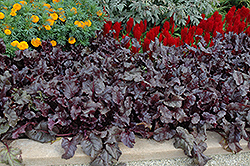Bull's Blood Beet Beta vulgaris 'Bull's Blood' Height: 18 inches Spread: 12 inches
Sunlight:
Hardiness Zone: (annual) Description: An heirloom variety primarily grown for its dark purplish-red leaves that can be added to salads; tasty beetroots can also be enjoyed; grown for ornametal purposes as well; a perfect edging along borders, or walkways, providing contrast to other plants Edible Qualities Bull's Blood Beet is an annual vegetable plant that is typically grown for its edible qualities, although it does have ornamental merits as well. The entire above-ground parts of the plant are edible, and are usually harvested from mid to late summer. The edible parts have a sweet taste and a crisp texture. The plant is most often used in the following ways:
Planting & Growing Bull's Blood Beet will grow to be about 18 inches tall at maturity, with a spread of 12 inches. This fast-growing vegetable plant is an annual, which means that it will grow for one season in your garden and then die after producing a crop. Because of its relatively short time to maturity, it lends itself to a series of successive plantings each staggered by a week or two; this will prolong the effective harvest period. This plant is quite ornamental as well as edible, and is as much at home in a landscape or flower garden as it is in a designated vegetable garden. It does best in full sun to partial shade. It does best in average to evenly moist conditions, but will not tolerate standing water. It is not particular as to soil pH, but grows best in rich soils. It is somewhat tolerant of urban pollution. This is a selected variety of a species not originally from North America, and it is considered by many to be an heirloom variety. Bull's Blood Beet is a good choice for the vegetable garden, but it is also well-suited for use in outdoor pots and containers. It is often used as a 'filler' in the 'spiller-thriller-filler' container combination, providing a canvas of foliage against which the thriller plants stand out. Note that when growing plants in outdoor containers and baskets, they may require more frequent waterings than they would in the yard or garden. Characteristics
Applications
Features & Attributes
|
